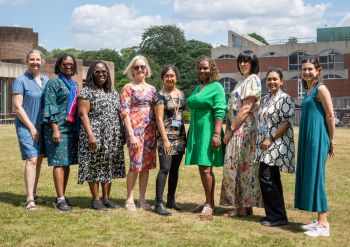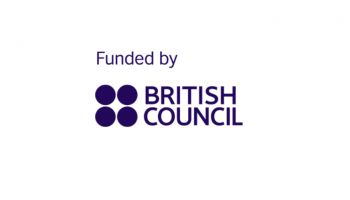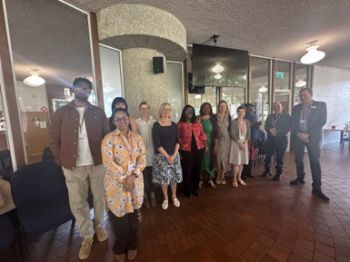News
Spotlight on Sussex–Ghana Exchange: Strengthening gender equity through cross cultural mentoring
Posted on behalf of: EDI Unit
Last updated: Tuesday, 5 August 2025

From left to right: Katie Bennett, Dr Gloria Ivy Mensah, Professor Deborah Atobrah, Professor Sarah Guthrie, Lily Singh, Akosua Serwah-Otchere, Sarah Law, Adity Shayontony Das, and Dr Judith Townend.


From left to right: Bud Johnston, Adity Shayontony Das, Sarah Law, Katie Walter, Sarah Guthrie, Deborah Atobrah, Akosua Serwah-Otchere, Tamsin Hinton-Smith, Catherine Liston-Heyes, Gloria Ivy Mensah, David Ruebain, Colin Shipp
The University of Sussex’s EDI Unit and Gender Equality Steering Group are leading work to improve gender equity at Sussex. This includes actions in our Athena Swan plan and the wider Inclusive Sussex strategy. As part of this work, Sussex is running a cross-cultural reciprocal mentoring project with the University of Ghana. The project is funded by the British Council’s Going Global Partnerships programme. It was supported in its early stages by the, Sussex Global Partnerships team who helped facilitate the relationship between the two institutions.
The project brings together over 40 participants across both universities. It is jointly led by Professor Sarah Guthrie, Chair of the Gender Equality Steering Group, and Professor Deborah Atobrah from the University of Ghana. Through mentoring partnerships and peer learning, the project helps staff advance their careers, build leadership skills, connect across cultures, and create change based on lived experience.
Celebrating learning and progress
The project started in January 2025 and has already gone beyond its original goals. There are now more than 20 active mentoring pairs, each consisting of one colleague from U. Sussex and one from U. Ghana. Each pair meets monthly to reflect on their work and career journeys and to share ideas. Participants also take part in monthly drop-in sessions and have access to training and resources.
So far, participants have discussed a wide range of topics in their mentoring conversations and support sessions. These include leadership, power and privilege, gendered barriers to career progression, cultural and institutional context, support for parents and carers, and how mentoring can support both personal growth and change in the workplace. Many participants are also using the programme to explore real opportunities for collaboration, including joint research, writing papers, podcast ideas and other projects. These connections are helping to build stronger networks and open new professional pathways.
The programme has also encouraged participants to think more intentionally about their goals. From the start, the training on inclusive and cross-cultural mentoring helped participants reflect on what they wanted to gain, how to approach the relationship, and how to support meaningful learning on both sides. These interactive sessions, delivered at both universities, helped build confidence, explore different perspectives and strengthen mentoring practice. Alongside ongoing support from the project team, this has helped participants get the most out of the experience. A practical toolkit and co-authored research paper are now in development to support long term impact and wider sharing of learning.
A warm welcome and rich exchange
In July 2025, three colleagues from the University of Ghana visited Sussex for a week-long exchange. They were:
- Professor Deborah Atobrah, Director of the Centre for Gender Studies and Advocacy (CEGENSA) at the University of Ghana.
- Dr Gloria Ivy Mensah, Senior Research Fellow at the Noguchi Memorial Institute for Medical Research at the University of Ghana.
- Akosua Serwah Otchere, Senior Administrative Assistant at CEGENSA
This was a key moment in the project and gave the team a chance to connect in person and share ideas.
During the visit, the team took part in a welcome lunch, a roundtable discussion on women’s leadership, a Gender Equality Steering Group meeting, and discussions with staff from across the University. Over the course of the week, they met with more than 20 key stakeholders from areas including HR, EDI, academic leadership, research, and student support. They also spent time with mentoring participants, creating space for honest conversations and mutual reflection.
The visit offered valuable insights into how both institutions are working to support gender equity and inclusive leadership. Colleagues shared experiences of policy and cultural change, including support for parents and carers, tackling gendered barriers to progression, and building inclusive research environments. In-person conversations helped strengthen relationships and spark new ideas for collaboration across research, leadership and practice.
Reflecting on the visit, Professor Deborah Atobrah said: “The most remarkable thing at Sussex is the warmth, engagement, openness and hospitality.” She highlighted the value of meeting “very different people who share the same interests” and praised the time and thought colleagues put into the visit. She particularly appreciated the chance to connect with Sussex’s HR Director Colin Shipp and Professor Robin Banerjee (PVC for Global and Civic Engagement) and spoke about the importance of global learning and partnerships in tackling complex equality challenges.
Looking ahead
A return visit to the University of Ghana is planned for later this year. Mentoring pairs will continue to meet until October 2025, with support from the project team. Learning from the project will also shape wider work at Sussex on mentoring, leadership and inclusion.
This collaborative project is one way in which Sussex is putting its Inclusive Sussex strategy into action. It shows how cross-cultural learning, peer support and shared experiences can drive change and help create a more equal and inclusive university.

